When Tyson Foods Inc. and Wal-Mart Stores Inc. received internal reports that employees may have paid bribes in Mexico, each faced the same vexing question: should they turn themselves in to U.S. authorities?
Tyson, the biggest U.S. food processor, admitted bribing government-employed inspectors and paid $5.2 million to avoid prosecution. Wal-Mart, the world's largest retailer, began an internal probe in 2005, shut it down and didn't disclose the matter to regulators and prosecutors until late last year, after learning the New York Times was investigating, the paper said.
The U.S. offers leniency to companies like Tyson that self-report. Yet many choose to remain quiet, calculating that they will cooperate with the government if it uncovers their bribery. Companies root out their wrongdoing and improve their compliance programs, assuming that any credit the government gives them for self-reporting is not worth the fines and penalties and negative publicity that follow disclosure.
“I've represented many, many companies that have elected reasonably not to disclose, and management at those companies was highly ethical,” said Joel Cohen, a former federal prosecutor now at Gibson, Dunn & Crutcher LLP's New York office. “Disclosure is not some magic bullet. The magic bullet is having a good system to mitigate corruption.”
Since 2008, the U.S. has resolved 50 corporate foreign bribery cases, costing companies $3.9 billion in fines and penalties. None of the top 10 cases involved voluntary disclosures, including those against Siemens AG, Europe's largest engineering firm; Kellogg Brown & Root LLC, which was spun off in 2007 from Houston-based Halliburton Co., the oilfield services company; and Daimler AG, the maker of Mercedes-Benz cars and trucks.
At least 21 companies self-reported, including Tyson; Johnson & Johnson, the world's second-largest health care company; and Aon Plc, the world's largest insurance broker.
Lawyers who have prosecuted or defended such companies estimate that only about a third of the 150 pending criminal cases resulted from voluntary disclosure. They said that hundreds of businesses don't reveal foreign bribery. The U.S. Foreign Corrupt Practices Act bars corporate employees or their agents from paying bribes to government officials to obtain or retain business or to secure an improper advantage.
Because FCPA cases are hard to detect and investigate, the U.S. offers the possibility of reduced penalties or charges for companies that self-report, cooperate with the government and strengthen their compliance programs.
'What's the Point?'
Lawyers typically urge self-disclosure for bribery allegations that involve senior management, an important contract, a whistle-blower, external auditors or a foreign regulator, said Claudius Sokenu, a former SEC attorney. Some industries also require self-reporting to the government.
“If it doesn't meet those factors, there's a significant chance that I would advise a client not to self-report,” said Sokenu, now at Arnold & Porter LLP. “What's the point? No good deed goes unpunished.”
Wal-Mart said it's cooperating with probes by the Justice Department and the Securities and Exchange Commission. The Bentonville, Arkansas-based retailer, which had sales of $444 billion in 27 countries in fiscal 2012, said it's working to strengthen corporate compliance worldwide.
The Justice Department and SEC encourage voluntary disclosure. Assistant Attorney General Lanny A. Breuer spoke to FCPA lawyers in November 2010, saying he understood the question of whether to self-report is a difficult one.
“If you do not voluntarily disclose your organization's conduct, and we discover it on our own, or through a competitor or customer of yours, the result will not be the same,” he said. “There is no doubt that a company that comes forward on its own will see a more favorable resolution than one that doesn't.”
Breuer said in a speech last November that the Justice Department will release “detailed new guidance” this year on the FCPA's criminal and civil enforcement provisions. Alisa Finelli, a Justice Department spokeswoman, said this week that Breuer wasn't available for further comment.
FCPA enforcement has increased as the Justice Department and SEC have targeted the oil and gas industries, freight-forwarding businesses, pharmaceutical companies and device makers, and financial institutions that deal with sovereign wealth funds. The government may generate cases through overseas regulators, whistle-blowers, media accounts, competitors, customers or stings by the Federal Bureau of Investigation.
Prosecution Guide
Prosecutors follow a nine-step guide on business prosecutions in deciding how to resolve cases. The criteria include the seriousness of the crimes, a company's history of wrongdoing, its willingness to cooperate, and the extent of compliance programs. The government may decide to charge a company or its subsidiaries, enter into deferred-prosecution or non-prosecution agreements or bring no charges at all.
Companies that disclose wrongdoing will be regarded favorably for being honest, said Richard Grime, a former SEC assistant director of enforcement.
“They're not going in after the government found out about it or it was in the press,” said Grime, now at O'Melveny & Myers LLP's Washington office. “They're walking in proactively and saying: 'This is something we found out about and want you to know about.”'
Disclosure helps companies to “crystallize whatever liability might be there,” he said.
“You have identified an issue and don't want it hanging on your books,” Grime said. “If they choose to move forward on the enforcement track, you know what the issue is, how the government frames it and what the fines and penalties may be.”
Prosecutors and regulators follow the U.S. Sentencing Guidelines and may reduce fines and penalties for companies that voluntarily disclose. That amount is difficult to measure because the government also credits the extent of a company's cooperation and its compliance program, and it doesn't break down the weight of each, said attorney Danforth Newcomb of Shearman & Sterling LLP.
“None of those calculations are algebraic or scientific or precise,” Newcomb said.
Companies also send a laudable message by disclosing wrongdoing, Newcomb said.
“Where there is a voluntary disclosure, there is a message that the senior management is not supportive of the conduct being alleged,” Newcomb said. “The tone at the top is one of the measures of an effective compliance program.”
J&J, which admitted making improper payments to government health care providers in Greece, Poland and Romania, got a 25 percent discount on its criminal fine of $21.4 million. Its total criminal and civil payments were $70 million.
BizJet
BizJet International Sales and Support Inc., a Tulsa, Oklahoma-based provider of aircraft maintenance, paid $11.8 million in March to resolve a bribery case. It got a 30 percent reduction on its criminal penalty for its voluntary disclosure, “extraordinary cooperation” and extensive remediation.
The biggest FCPA case ever settled involved Siemens, which agreed to pay $800 million to the U.S. and $814 million to German authorities in 2008. It didn't self-report, but U.S. prosecutors cited the “exceptional” cooperation and remediation of Siemens, which spent another $1 billion on lawyers, accountants and internal controls. Its settlement followed a raid by authorities on its German offices.
In a case involving $6 billion in contracts in Nigeria, joint venture partners that built liquefied natural gas facilities admitted using agents to funnel $182 million in bribes to government officials.
The partners resolved their cases by paying a total of $1.5 billion. Houston-based Kellogg Brown & Root LLC settled in 2009; Paris-based Technip SA and Amsterdam-based Snamprogetti Netherlands BV reached accords in 2010; and Tokyo-based JGC Corp. settled last year.
In January, Tokyo-based Marubeni Corp. paid $54.6 million as a criminal penalty to resolve charges related to its role as agent for the joint venture. Each got credit for cooperation and remediation, not voluntary disclosures.
Voluntary disclosures might increase because of the passage of the Dodd-Frank Act of 2010, which lets corporate whistle-blowers collect as much as 30 percent of penalties when they report financial wrongdoing, said Timothy Dickinson, an attorney at Paul Hastings LLP's Washington office.
Game Changer
“The big game changer has been the Dodd-Frank bill,” Dickinson said. “If a company is doing an internal audit and came across something 10 years ago it might have said, 'We have a problem, and we'd better fix that.' Today, one of the first things a company has to ask is, 'Should we self-report?”'
Many FCPA lawyers believe that self-reporting means that companies lose control of an investigation being handled by an outside law firm, Dickinson said.
“While that may be the case in certain circumstances, I would expect the government to act reasonably even after a disclosure if the government expects to build trust and confidence with the FCPA bar,” he said.
Newcomb said that lawyers working in voluntary disclosure cases have some measure of control over investigations.
“I was brought in for a case with a company doing business in 100 countries,” he said. “I talked the government into letting the company's lawyers do investigations in only about 20 of those countries.”
Faced with evidence of possible wrongdoing in distant corners of the globe, top managers at multinationals must make hard choices in authorizing expensive investigations by outside law firms, said Gregory Bruch of Willkie Farr & Gallagher LLP.
'Costs are Apparent'
“The costs are apparent, and quantifiable, while the benefits seem very intangible,” Bruch said.
When chief executives try to quantify the cost of major decisions, they lack specific guidance from the Justice Department on FCPA cases, Bruch said.
“The attorney-client privilege is an intangible asset,” he said. “You're talking about giving up assets and spending money in an area where there are uncertain liabilities and uncertain benefits.”
FCPA cases typically are run by one or two Justice Department lawyers, working with SEC attorneys and FBI agents. They work with law firms for companies that turn over documents and e-mails, while interviewing corporate witnesses.
Steven Tyrrell, a Justice Department fraud section chief from 2006 to 2009, said that voluntary disclosures mean that government lawyers with little knowledge of the facts may direct attorneys for companies to expand their investigations.
“It's a negotiation,” Tyrrell said. “The company lawyers may say they talked to witnesses in China and Vietnam, and the government may say 'Why don't you talk to witnesses in Indonesia?' I wouldn't say that's losing control. But you have to answer to someone who's going to make decisions about whether your investigation has been appropriately thorough.”
Tyrrell, a partner at Weil Gotshal & Manges LLP in Washington, estimated that about one-third of the DOJ's 150 pending FCPA investigations involve voluntary disclosures.
Many companies have concluded that they can't see a concrete benefit in making a voluntary disclosure, said Paul Berger, a former SEC associate director of enforcement now at Debevoise & Plimpton LLP.
“It's very, very tough to answer your client's question and say there is a real, palpable benefit from self-reporting,” Berger said. Many companies conclude they will avoid the sanctions that follow from self-reporting, he said.
'Fully Compliant'
“They say, 'We'll fully investigate the issue, fix the problem and make sure we're fully compliant with the law, discipline or fire employees, and enhance our compliance system,”' he said. “They say, 'We'll do everything the government would have told us to do had we gone in, but we won't have a sanction.”'
Companies have a hard time in deciding what to do, he said.
“Most of them want to do the right thing,” Berger said. “The problem is there's not enough information out there in public domains as to the benefits of voluntary disclosure. The government needs to issue more guidance as to what the true benefits are.”
Grime said that many companies fear the consequences of voluntary disclosures.
“The unknowable benefit is either not sufficiently clear or doesn't neutralize the fact of dealing with your problem publicly,” Grime said.
“The reality is that all the government can do is take a discount on fines and penalties,” he said. “At the end of the day for companies, money is not the issue. Wal-Mart can stomach the fines, but it's the collateral consequences, the publicity and the reputational harm that makes voluntary disclosure unpalatable.”
Bloomberg News
© Touchpoint Markets, All Rights Reserved. Request academic re-use from www.copyright.com. All other uses, submit a request to [email protected]. For more inforrmation visit Asset & Logo Licensing.



